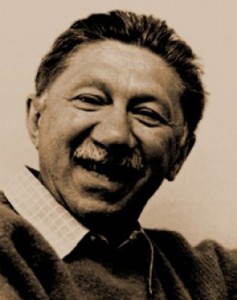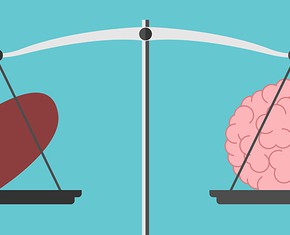The views expressed in our content reflect individual perspectives and do not represent the authoritative views of the Baha'i Faith.
Why do we search our souls, anyway? Usually, because we’re not happy where we are—so shouldn’t a spiritual search lead us towards joy?
If our spiritual journey doesn’t take us toward greater attainment, a happier heart, a satisfied soul, a more delightful life, then what use is it?
Baha’is believe attaining that happiness is the birthright of every human being. Abdu’l-Baha constantly encouraged delight and gladness in everyone he met. He invited an audience in London to joy and happiness with these uplifting words:
O Ye that sleep, Awake! O ye heedless ones, Learn wisdom! O Blind, receive your sight! O Deaf, Hear! O Dumb, Speak! O Dead, Arise! Be Happy! Be Happy! Be full of Joy! – Abdu’l-Baha in London, p. 126.
In The Four Valleys, Baha’u’llah said that the second valley would produce tests and trials for the seeker: “Now is he lifted up to heaven, now he is cast into the depths.” (p. 53.) But in a surprising, completely non-intuitive way, those tests and trials, when we face them and conquer them, can give us great joy:
To the loyal soul, a test is but God’s grace and favour; for the valiant doth joyously press forward to furious battle on the field of anguish, when the coward, whimpering with fright, will tremble and shake. So too, the proficient student, who hath with great competence mastered his subjects and committed them to memory, will happily exhibit his skills before his examiners on the day of his tests. So too will solid gold wondrously gleam and shine out in the assayer’s fire.
It is clear, then, that tests and trials are, for sanctified souls, but God’s bounty and grace, while to the weak, they are a calamity, unexpected and sudden.
These tests, even as thou didst write, do but cleanse the spotting of self from off the mirror of the heart, till the Sun of Truth can cast its rays thereon; for there is no veil more obstructive than the self … – Abdu’l-Baha, Selections from the Writings of Abdu’l-Baha, p. 181.
So the mysterious process of spiritual search can generate a sense of nobility from our efforts, from our struggle, from our hard-won victories over ourselves. That growing sense of nobility and purpose gives us the strength to fight the spiritual battles of life. It uses our needs as capacities and helps us develop the spiritual virtues inherent in our souls. It can bring us pure, unalloyed exhilaration.
This kind of intense spiritual joy serves as the heart and soul of all religious truth:
He who knows all and sees all, and whose glory the universe knows, dwells as the Spirit of the divine city of Brahman in the region of the human heart. He becomes mind and drives on the body and life, draws power from food and finds peace in the heart. There the wise find Him as joy and light and life eternal. – The Hindu Upanishads.
Then the eyes of the blind shall be opened, and the ears of the deaf shall be unstopped. Then shall the lame man leap as an hart, and the tongue of the dumb sing: for in the wilderness shall waters break out, and streams in the desert … And the ransomed of the Lord shall return, and come to Zion with songs and everlasting joy upon their heads: they shall obtain joy and gladness, and sorrow and sighing shall flee away. – Isaiah, 35:5-10.
Let everything be as friendly to us as anything can be: may we go smoothly along the roads, find good pathways in the mountains, run easily through the forests, and cross happily the rivers! – Zoroaster, The Zend-Avesta
That mendicant, with utter joy and gladness filled, firm in the teaching of the Awakened One, reaches the bliss where all conditions cease, reaches the State of Peace. Lo, ye! a mendicant, though young he be, that strives to grasp the teaching of the Awakened One, lights up the world, as, from a cloud released, the moon lights up the night. -The Buddhist Dhammapada
If ye keep my commandments, ye shall abide in my love; even as I have kept my Father’s commandments, and abide in his love. These things have I spoken unto you, that my joy might remain in you, and that your joy might be full. – John, 15:10-11.
No soul knoweth what joy of the eyes is reserved for the good in recompense of their works. -The Qur’an, Sura 32.
O Son of Spirit! With the joyful tidings of light I hail thee: rejoice! To the court of holiness I summon thee; abide therein that thou mayest live in peace for evermore. – Baha’u’llah, The Hidden Words, p. 11.
Joy gives us wings. In times of joy our strength is more vital, our intellect keener, and our understanding less clouded. We seem better able to cope with the world and to find our sphere of usefulness. – Abdu’l-Baha, Paris Talks, p. 109.

Abraham Maslow
The psychologist and philosopher Abraham Maslow, in his book Religions, Values and Peak Experiences, wrote that when we begin to transcend the self and the ego, we can start to perceive the whole universe as an integrated and unified whole, which gives meaning and joy to life. With that meaning, we discover and reawaken the emotions of wonder, awe, reverence, humility, surrender and even worship again, transcending life’s dichotomies, polarities and conflicts.
People pursue all sorts of outward activities to reach the point of such fulfillment and exhilaration in life, and yet the founders and prophets of the great Faiths continue to remind humanity that it lives inside us, waiting for liberation. This transcendence, Maslow writes, frees us from ourselves, creating “a river without dams:”
The person in the peak-experiences feels more integrated (unified, whole, all of a piece) than at other times. As he gets to be more purely and singly himself he is more able to fuse with the world, with what was formerly not-self … The person in the peak-experiences usually feels himself to be at the peak of his powers, using all his capacities at the best and fullest … He feels more intelligent, more perceptive, wittier, stronger, or more graceful than at other times. He is at his best, at concert pitch, at the top of his form. He is no longer wasting effort fighting and restraining himself; muscles are no longer fighting muscles. In the normal situation, part of our capacities are used for action, and part are wasted on restraining those same capacities. Now there is no waste; the totality of the capacities can be used for action. He becomes like a river without dams. – Toward a Psychology of Being, pp. 104-6.
















Comments
Sign in or create an account
Continue with Googleor